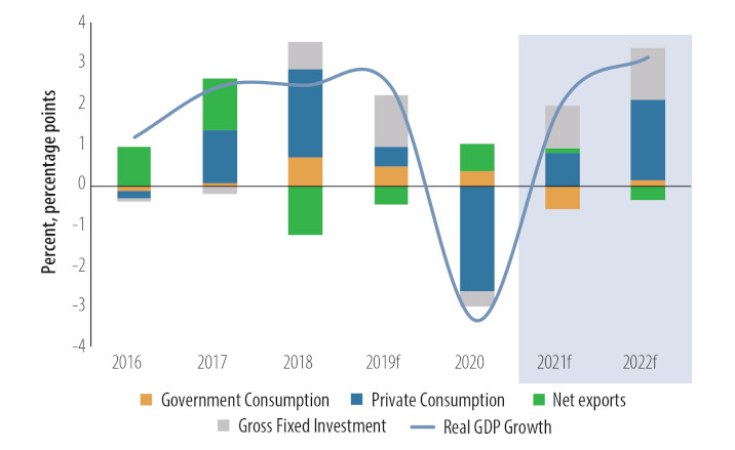
- The latest Africa’s Pulse, the economic analysis for the region, suggests governments prioritize policy reforms and investments to foster a strong economic recovery
- The analysis predicts economic activity will decline by 3.3 percent in 2020, confirming the region’s first recession in 25 years
- Recommendations include sectoral reallocation policies to focus on modern economic sectors, and spatial integration policies to support more efficient job creation
Washington — As Sub-Saharan African countries continue to face economic uncertainty in the time of COVID-19, the region’s latest macroeconomic analysis says governments can look to policy reform as a driver of economic recovery.
Africa’s Pulse: Charting the Road to Recovery projects economic activity will decline by 3.3 percent in 2020, the region’s first recession in 25 years. COVID-19 also threatens to push up to 40 million people into extreme poverty in Africa, eroding many of the development gains of the past decade. The analysis recommends governments seize the opportunity within the crisis to develop policies and prioritize investments that build greater resilience, boost productivity and generate jobs.
“Steady recovery in Sub-Saharan Africa after the COVID-19 pandemic requires policies that foster sustained growth and build resilience, but growth alone is not enough,” said Albert Zeufack, World Bank Chief Economist for the Africa regions. “African countries need to prioritize now policies and investments to create more better and inclusive jobs: that’s the key to sustained, inclusive and resilient growth.”
The Pulse notes that while the health consequences of the COVID-19 pandemic have been less devastating than expected, the combination of domestic lockdowns and related spillovers from the global recession significantly impacted economic activity. In Nigeria and South Africa, the region’s two largest economies, growth declines were particularly pronounced, with sharp drops by 6.1 percent and 17.1 percent year-on-year, respectively.
Amid the significant economic declines, the analysis recommends governments look to policies African countries need to move toward productivity-driven growth, and create more, better and inclusive jobs. While Pulse authors acknowledge that the road to recovery will be long and arduous—particularly as the region’s economic future remains uncertain amid concerns of a second wave of COVID-19 infections—they recommend governments aim to prioritize and support policies and investments that focus on connecting people to job opportunities, which can help end extreme poverty, particularly post-COVID-19.
The Pulse notes that the pandemic has also underscored the importance of the digital economy enabling governments, business and society in a time of lockdowns and social distancing, while recognizing government interventions to reduce the cost of devices and services, avoid disconnections for lack of payment, and increase bandwidth. These measures have been complemented by actions to facilitate network expansion and adopt new technologies, such as Google Loon in Kenya and Mozambique, and the boosting of internet efficiency in Ghana.
Noting that adoption of digital technologies by governments, households and firms in Sub-Saharan Africa still lag behind that of other regions in the world, the Pulse recommends improvements in areas from digital infrastructure and business models, to digital skills and literacy, as well as more effective regulation to expand digital infrastructure and make connectivity affordable, reliable and universal.
In addition to recommending reconstituting of fiscal space to help governments finance programs that will stimulate economic recovery, the Pulse also highlights the following areas for policy consideration:
Sectoral reallocation policies, to foster the shift from exporting raw materials to greater value addition and intra-Africa value chains. As global trade takes time to recover, policymakers in the region need to promote the development of regional value chains while they are building the foundations and capabilities needed for more comprehensive continental involvement. The African Continental Free Trade Area (AfCFTA) has an important role to play by reducing production costs associated to tariffs, non-tariff barriers and trade facilitation problems. The AfCFTA can also help organize production across the region, expand intra-regional trade and build resilience along supply chains.
Spatial integration policies, to foster agricultural productivity and reallocate resources to more efficient job-creating locations through enhanced rural-urban and inland-coastal connectivity and investing in cities. Well-functioning cities are the cradle of innovation and of higher productivity, tradable industrial and service sectors. Boosting agriculture productivity, and improving living conditions in rural areas, including food security, will play a critical role. Scaling up infrastructure spending to invest across urban and rural areas, particularly, expanding access to basic infrastructure services.
Economic Outlook
The Pulse predicts the region will rebound in 2021, however growth will vary across countries. While South Africa is expected to experience a weak recovery, overall growth in Eastern and Southern Africa region is expected to average 2.7 percent. Several countries, such as Ethiopia, have started to take advantage of the opportunity to put policy reforms in place.
“We’ve seen that Angola, Ethiopia and South Africa have accelerated reforms during this time, ensuring that they are poised for growth when the threat of the pandemic has subsided,” said Hafez Ghanem, World Bank Vice President for Eastern and Southern Africa. “There’s no escaping the economic impact that COVID-19 has had on the sub-region, but accelerating reforms is one way to be in the best possible position post-pandemic.”
While the Pulse notes Nigeria’s economic recovery will be weak as well, the Western and Central Africa region is expected to experience an average growth of 1.4 percent.
“Charting the course to rapid recovery will also require massive investments across countries throughout the region, which governments must prepare for,” said Ousmane Diagana, World Bank Vice President for Western and Central Africa. “The recovery journey will be difficult, but without the advancement of structural reforms, robust growth post-pandemic will be even more challenging.”




No comments :
Post a Comment